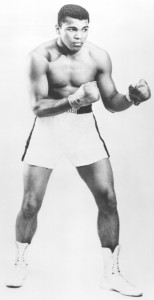

Jones staggered Clay in the first round, and the unanimous decision for Clay was greeted by boos and a rain of debris thrown into the ring. The number two and three heavyweight contenders respectively, Clay and Jones fought on Jones' home turf at New York's Madison Square Garden. The fight with Doug Jones on March 13, 1963, was Clay's toughest fight during this stretch. However, the round had ended by the time he rose, and he recovered between rounds, going on to win in the predicted 5th round due to Cooper's severely cut eye. In the Cooper fight, Clay was floored by a left hook at the end of round four, and was groggy when he got up at the count of three. Clay was knocked down by both Sonny Banks and Cooper. These early fights were not without trials.


Clay also beat his former trainer and veteran boxer Archie Moore in a 1962 match. He defeated boxers including Tony Esperti, Jim Robinson, Donnie Fleeman, Alonzo Johnson, George Logan, Willi Besmanoff, LaMar Clark, Doug Jones and Henry Cooper. From then until the end of 1963, Clay amassed a record of 19–0 with 15 wins by knockout. On-site poster for Cassius Clay's fifth professional boutĬlay made his professional debut on October 29, 1960, winning a six-round decision over Tunney Hunsaker. He was inducted into the International Boxing Hall of Fame in the inaugural class of 1990. In December 2007, ESPN listed Ali second in its choice of the greatest heavyweights of all time, behind Joe Louis. In 1999, Ali was named the second greatest boxer in history, pound for pound, by ESPN behind only welterweight and middleweight legend Sugar Ray Robinson.

In 1999, The Associated Press voted Ali the number one heavyweight of the 20th century. Boxing magazine The Ring named him number 1 in a 1998 ranking of greatest heavyweights from all eras. Muhammad Ali is widely regarded by many boxing commentators and historians as the greatest heavyweight boxer of all time.


 0 kommentar(er)
0 kommentar(er)
